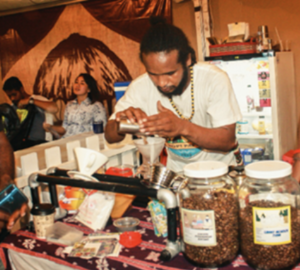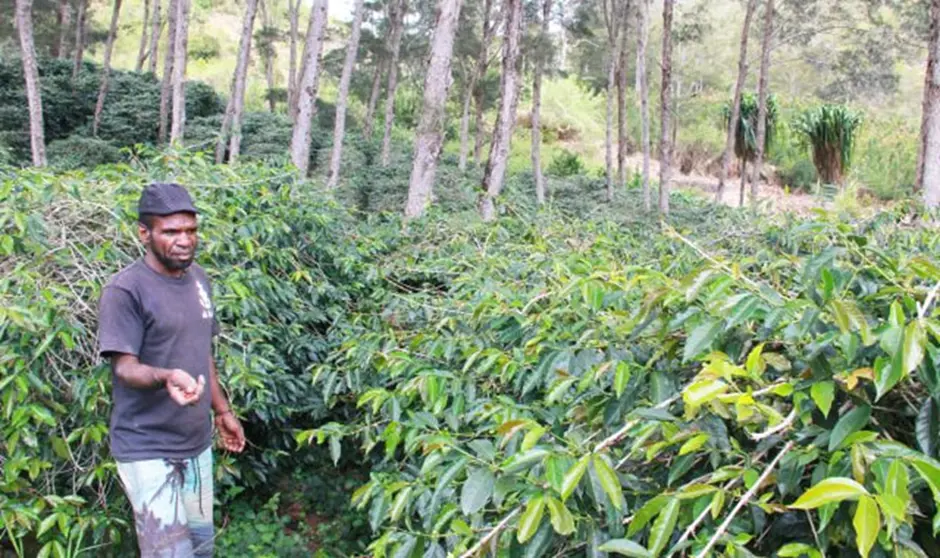PAPUA PEGUNUNGAN – Before being divided into four provinces, Papua’s economic development continued to be dominated by the mining sector in Mimika Regency, efforts to improve the economy from the non-mining sector continued even though in quantity it still had not obtained significant results, from several existing commodities coffee was one of the commodities that continued to be pursued to be a driver of improving the welfare of the Papuan people, especially in mountainous areas.
Bank Indonesia Of Papua Representative Office, since the last 7 years, has held the Papua Coffee Festival six times, Senior Deputy Governor of Bank Indonesia Destry Damayanti who attended the 2023 Papua Coffee Festival said, the coffee plantation area in Papua was only 13,991 hectares with a total production of 2. 799 tons per year based on these data, the contribution of the coffee plantation area in Papua to the National is only 1.09 percent and the share of total coffee production in Papua to the national is 0.35 percent, but this illustrates that there is still a huge opportunity to continue to develop the coffee industry in Papua given the very high potential of Papua Coffee, although in quantity it is still very small, Destry said Papua Coffee beans are in demand by the National and International Markets because they have a unique taste, therefore the development of the plantation area is expected to continue so that the quality side of Papua Coffee can be accompanied by the quantity factor.
The smell of the name Papuan coffee, which is dominated by the type of Arabica coffee beans, has apparently been smelled to foreign markets, one of which is Japan, which is interested in Papuan coffee and it’s just that this interest cannot be matched by the stock situation.
This is a great opportunity to be able to lift the economy of coffee farmers who are generally located in mountainous areas and enthusiasts always say that Papuan Coffee is good, delicious and tastes unique, more complex and rich.
The existence of Papuan coffee beans spread across several districts is not only difficult to meet the demand of the national or international market, but even for local needs it is sometimes not enough.
Most people in the Papua Mountains region still depend on crops, apart from the difficulty of access to transportation, the lack of employment opportunities is also the cause. When Papuan coffee began to be recognized in the wider market, there was new hope for the farmers, as recognized by Moses Jigibalom, Moses has served buyers from Jakarta and Kalimantan, although most of his coffee beans are absorbed by the market in Jayapura. Moses, who is only 29 years old, has focused on being a coffee farmer and collector in Lanny Jaya for several years.

According to Moses, so far his economic condition has continued to improve because no matter how many coffee beans he produces and collects, there must be buyers, “we can reach 2 tons in the form of grain in one year, after processing the amount becomes about 1 tons, the existing stock is all bought, so if there is an increase in production, everything is absorbed,” said Moses.
Moses life is increasingly established because of the coffee he harvests himself, but Moses is also worried about the existence of coffee farms in the future, this is because coffee farmers in Lanny Jaya are parents who are over 40 years old, the younger generation or people his age are still more interested in pursuing professions such as the State Civil Apparatus or also politicians. Moses also hopes that the government can be more proactive in seeing farmers so that coffee can soon become an industry that can attract young people.
In addition, Moses also asked the government to be able to help the needs of farmers, especially coffee farmers, because Lanny Jaya is a mountainous area located more than 2,000 meters above sea level and farmers really need rocks for drying coffee beans.
Improving the welfare of the community is emphasized by Moses to be the main focus of the Government and especially for those who live in remote areas whose infrastructure is still lagging behind other regions in Indonesia, with the intervention of the Government Moses believes coffee in Lanny Jaya can become an industry that will have an impact on other sectors of life so that people in remote Papua can truly feel the same justice as other communities in Indonesia.


